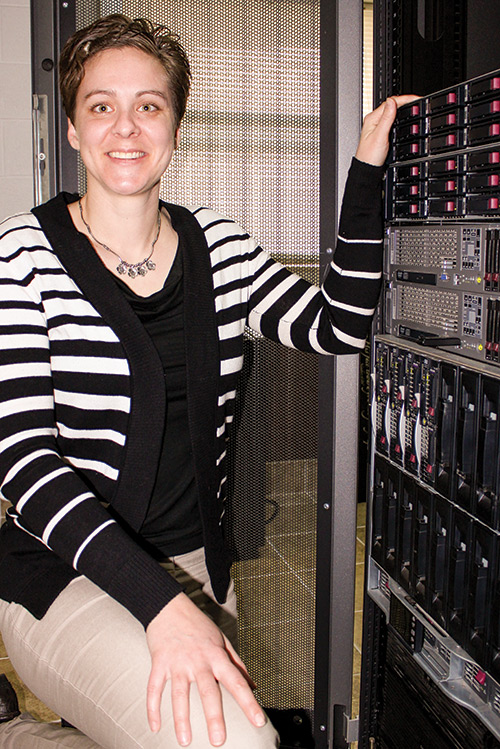
Rochelle Yoder was a strong math student in school and an innate problem-solver. Always captivated by her father’s MS-DOS computer, she began taking computing classes in high school, but soon found the field’s disparity in gender representation daunting. College classes followed the same form of a sparse female presence.
“This was fine,” Yoder says, “except I was slow to ask questions, thinking that the guys understood everything and I was, for some reason, slow at understanding.” Two factors helped her to thrive in computer science: the support of professors and an internship in Washington D.C.
“I remember being so excited to have Deirdre Smeltzer [a current EMU vice president] as a math professor my senior year,” says Yoder, who graduated with a mathematics minor. “I was in awe of her, simply because she was a woman math professor. It was the first time I wasn’t intimidated to ask questions.” Department chair of mathematical sciences Owen Byer also recognized her math prowess, and encouraged Yoder to persevere through coursework.
Even with this education and validation, Yoder “still felt insecure and inadequate to land a job in any computer field.” She had studied computing theory, but was unprepared for friends’ and family’s requests for technical assistance.
Throughout this time, Yoder hoped to get married right out of college and raise children as a stay-at-home mother. After graduation, though, she had to support herself. She worked at the Little Eden Camp and Retreat Center in Onokema, Michigan, and as a substitute teacher at her old high school in Illinois. She then spent three years with Mennonite Voluntary Service at the Hopi Mission School in Kykotsmovi, Arizona.
“It’s common knowledge, in Mennonite circles, that lots of people meet their spouses during their years of service,” she says. But rather than finding a mate, Yoder found herself immersed in computer and network administration, and began taking online classes in computer hardware, networking, and trouble shooting. Her confidence grew, and she sought to return to the computer field after moving to Wayne County, Ohio. There, she would be closer to immediate and extended family, Mennonite culture of service projects and good food, “and probably meet a lonely Mennonite guy in his mid- to late twenties.”
She shadowed Eric Yoder, class of ‘93, at Stone Wheel Technologies. The pressures of self-employment, however, led her to a summer internship with the Smith Dairy manufacturing plant – a gig that morphed into a five-year job. Here, Yoder finally recognized the power of her intelligence and abilities, separate from her gender or marital status.
“As I worked closely with my male co-workers, I realized I knew just as much as they did – and sometimes more. I became more and more aware of an unconscious barrier in my life: a stereotype that men have more technical knowledge than women. I knew I was capable, but had unconsciously thought less of my skill than my male colleagues.”
Through continued business camaraderie with Eric Yoder, she interviewed with ARCIS Technology Group and joined their team – where she does programming, project management, networking and server administration, seminars, and desktop support for the Wayne County area. There, she has recognized a unique skill set that she brings to the I.T. world – interpersonal communication skills, in which she sees her gender as an asset.
“I can reach through the knowledge gap and relate to the client on their level and communicate effectively,” Yoder explained, “instead of confusing the client with the highly technical language used by many of my male contemporaries.”
She continues to rewrite the instructions of gender roles, saying that presenting a final, beneficial product to a client prompts a similar feeling to watching your child take the first step.
“Laugh if you like,” she declared, “but parenting is not the only rewarding job a woman can do. And I get to sleep through the night.” Yoder, now in full ownership of her voice and skills, urges potential computer scientists “to be brave; despite your doubts and insecurities, hold on and learn. . . go and make your world better. God is there.”